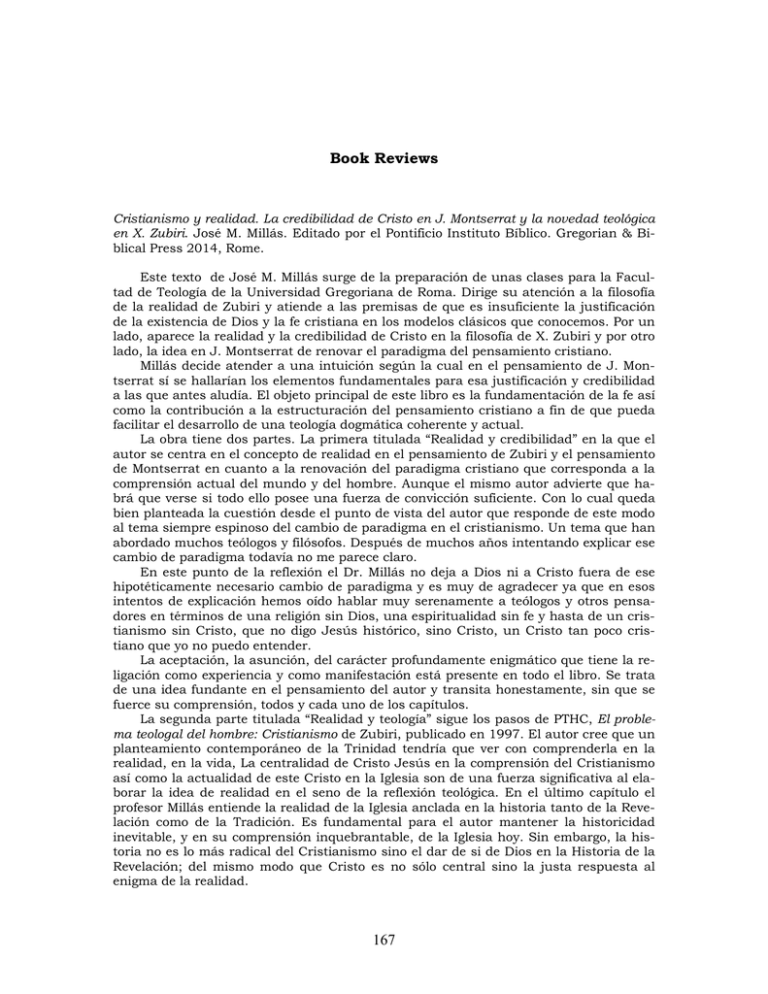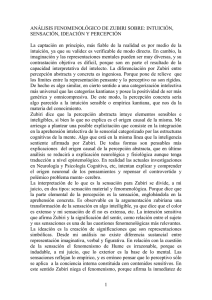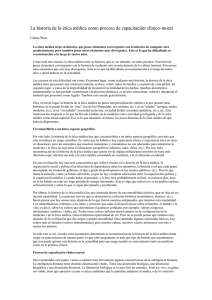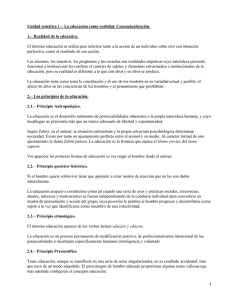Book Reviews
Anuncio

Book Reviews Cristianismo y realidad. La credibilidad de Cristo en J. Montserrat y la novedad teológica en X. Zubiri. José M. Millás. Editado por el Pontificio Instituto Bíblico. Gregorian & Biblical Press 2014, Rome. Este texto de José M. Millás surge de la preparación de unas clases para la Facultad de Teología de la Universidad Gregoriana de Roma. Dirige su atención a la filosofía de la realidad de Zubiri y atiende a las premisas de que es insuficiente la justificación de la existencia de Dios y la fe cristiana en los modelos clásicos que conocemos. Por un lado, aparece la realidad y la credibilidad de Cristo en la filosofía de X. Zubiri y por otro lado, la idea en J. Montserrat de renovar el paradigma del pensamiento cristiano. Millás decide atender a una intuición según la cual en el pensamiento de J. Montserrat sí se hallarían los elementos fundamentales para esa justificación y credibilidad a las que antes aludía. El objeto principal de este libro es la fundamentación de la fe así como la contribución a la estructuración del pensamiento cristiano a fin de que pueda facilitar el desarrollo de una teología dogmática coherente y actual. La obra tiene dos partes. La primera titulada “Realidad y credibilidad” en la que el autor se centra en el concepto de realidad en el pensamiento de Zubiri y el pensamiento de Montserrat en cuanto a la renovación del paradigma cristiano que corresponda a la comprensión actual del mundo y del hombre. Aunque el mismo autor advierte que habrá que verse si todo ello posee una fuerza de convicción suficiente. Con lo cual queda bien planteada la cuestión desde el punto de vista del autor que responde de este modo al tema siempre espinoso del cambio de paradigma en el cristianismo. Un tema que han abordado muchos teólogos y filósofos. Después de muchos años intentando explicar ese cambio de paradigma todavía no me parece claro. En este punto de la reflexión el Dr. Millás no deja a Dios ni a Cristo fuera de ese hipotéticamente necesario cambio de paradigma y es muy de agradecer ya que en esos intentos de explicación hemos oído hablar muy serenamente a teólogos y otros pensadores en términos de una religión sin Dios, una espiritualidad sin fe y hasta de un cristianismo sin Cristo, que no digo Jesús histórico, sino Cristo, un Cristo tan poco cristiano que yo no puedo entender. La aceptación, la asunción, del carácter profundamente enigmático que tiene la religación como experiencia y como manifestación está presente en todo el libro. Se trata de una idea fundante en el pensamiento del autor y transita honestamente, sin que se fuerce su comprensión, todos y cada uno de los capítulos. La segunda parte titulada “Realidad y teología” sigue los pasos de PTHC, El problema teologal del hombre: Cristianismo de Zubiri, publicado en 1997. El autor cree que un planteamiento contemporáneo de la Trinidad tendría que ver con comprenderla en la realidad, en la vida, La centralidad de Cristo Jesús en la comprensión del Cristianismo así como la actualidad de este Cristo en la Iglesia son de una fuerza significativa al elaborar la idea de realidad en el seno de la reflexión teológica. En el último capítulo el profesor Millás entiende la realidad de la Iglesia anclada en la historia tanto de la Revelación como de la Tradición. Es fundamental para el autor mantener la historicidad inevitable, y en su comprensión inquebrantable, de la Iglesia hoy. Sin embargo, la historia no es lo más radical del Cristianismo sino el dar de si de Dios en la Historia de la Revelación; del mismo modo que Cristo es no sólo central sino la justa respuesta al enigma de la realidad. 167 168 Book Reviews Cristianismo y realidad representa una significativa aportación a las revisiones y estudios de teología dogmática que se están realizando hoy. El rigor y la seriedad del profesor Millás en todos sus planteamientos son de indiscutible valor en las reflexiones teológicas y filosóficas contemporáneas. Dra. Nativitat Senserrich y Morata * * * La actualidad de lo real en Zubiri: crítica a Husserl y Heidegger, José Alfonso Villa Sanchez, Plaza y Valdes, 2014, México D.F., 328 pp., 300 pesos. (Available from www.plazayvaldes.com). This fine book, by Professor José Alfonso Villa, is a great addition to the literature on Zubiri. As its title suggests, it is about the subject of actuality of the real in Zubiri’s philosophy. The author develops this subject in a very insightful manner, which enlightens many aspects of the subject. But the book also works to clarify the topic of actuality by comparing and contrasting Zubiri’s view of the subject with those of Husserl and Heiddeger, and other philosophers, principally Aristotle. As the author points out in the Introduction, Zubiri himself did not systematically develop the notion of actuality, though it appears throughout his mature philosophy. This book takes up that challenge, and does so in a very thorough and easy to read manner. It begins by showing how Zubiri transforms phenomenology into filosofía primera. It then discusses actuality and the philosophy of actuality in two chapters, and continues with a treatment of sentient intelligence in the context of actuality and Husserl’s philosophy. The remaining chapters cover actualization of the real, a dialog with Aristotle, actuality and being, and the transcendental order and being. The explanations and discussions in the book are quite clear and can be understood even by someone with minimal exposure to Zubiri. But they are sophisticated enough to appeal even to those who are experts. I highly recommend this book for all Zubiri libraries. Thomas B. Fowler El estatuto biológico y ontológico del embrión humano, Francisco Güell, Bern: Peter Lang, 2013, 610pp, $137.95. This book is an investigation of the biological and ontological status of the human embryo, based on Zubiri’s philosophy. In particular, it utilizes his notions of essence and substantivity. It is an attempt to bridge the longstanding gap between the way that the sciences perceive the world, and the way that the humanities—and in particular philosophy—perceive the world. Zubiri himself of course always sought to do this; but the present book does so by focusing on a topic of particular interest today in bioethics. The book is divided into three principal parts: Part I is a detailed exposition of the principal notions of Zubiri’s philosophy, especially those in Sobre la esencia [On Essence]. The second part shifts to biology and gives a detailed explanation of the development of the human embryo from the standpoint of the biologist and physiologist. In the third part there is a precise description of biological reality intended for the purposes of ontological and ethical examination and reflection. The author believes—and no doubt Zubiri would concur—that there is a continuity between biological and philosophical investigation. In his conclusion, Prof. Güell notes that “the conclusions about the analysis of the substantive character of the embryo, about the constitutive sufficiency of the embrio and about the essentiality or constitutionality of the genetic and epigenetic material correspond to the precision which Zubiri bestows upon the meaning of “substantivity,” The Xavier Zubiri Review 2013-2015 Book Reviews 169 “constitutional sufficiency,” and “essence.” (p. 562) The point of the book is to demonstrate that a complete understanding of the genetic process of the human requires more than biology; it requires a grasp of philosophical concepts such as those provided by Zubiri. I recommend this book highly for all who are interested in biology, in Zubiri’s views of science, and in questions about the uniqueness of humans. Though long, it is a very worthwhile study. The Xavier Zubiri Review 2013-2015


